- Home
- Anne Spackman
The Empire: Book Six of Seeds of a Fallen Empire Page 2
The Empire: Book Six of Seeds of a Fallen Empire Read online
Page 2
Chapter Two
What was Ariyalsynai? City of wonders, city of beauty, city of the elite, and city of the forgotten.
The capital of Seynorynael, Ariyalsynai, was a terribly beautiful city, but full of evil and ruin, the ruin of man. “Star mountain”, “white mountain”—Ariyal-synai was a pretentious city that had become the gateway to the stars.
The boy was crying in desperation, out of hunger.
The earliest moments of his life were but a wash of colors, sights that seemed blurred. When he remembered back upon his earliest memories, he often wondered why the sounds were missing. Memories—by the time he was able to retain them, the events that would have illuminated the reasons for the condition he was in were as far gone as last year’s city-wide trash pile.
He had no memory of his mother’s face left to him, but her voice was the one sound that lingered in his earliest recollections when he turned off his senses, senses that responded to the outside world, so that he could drift in his own consciousness. Sometimes, this was the only way to get through the day.
He was four long Seynorynaelian years old.
For as long as he remembered, he had survived on whatever he could find: rotten trash left about by careless people picnicking by the artificial rivers in the city parks, handouts from people on the streets unnerved by the ravenous expression in his eyes, scraps the other vagrant people kindly sacrificed to the beggar-child who, like them, lived at the mercy of fortune and prey to the whims of chance.
When he had grown older, he had found he could sneak into public buildings and pilfer small items from the food replication units; after a time, he learned to wait until nightfall to pilfer the sherin and other alimentary fruit-bearing orchards in the city arboretums; he lived by whatever means necessary, glutting himself when opportunity presented itself, while other times he went for days without food.
Ravenous hunger was the fundamental component of his reality. He was incapable of imagining a world in which there was no hunger, no pain, no endless foraging and sleeping to conserve energy when at last his thin, frail body succumbed to exhaustion.
He would eat anything, regardless of taste.
For the longest time, he didn’t understand the most fundamental principles of life. He didn’t understand the smiles so many of the people wore; the expression simply had no recognizable meaning for him. He knew that at one point he hadn’t been in his present condition, that someone had spoken to him, told him stories, laughed with him—there was a dim recollection beyond his misery that he had once been content.
He didn’t know that he must have been cared for, not very long ago. The pants he wore hung loosely about him from the waist down but halted at his calf. His body swam within a thin worn shirt with sleeves that reached just past his elbows. He had no shoes. Then, at one point, one of the local vagrants who lived under the shadow of the aqueduct took pity on him and called the child over; the boy cast suspicious, nervous glances and refused to go, until the vagrant chased him and swept him up in thin, sinewy arms.
The boy screamed like mad, but there was no one to hear. He didn’t know that this vagrant had taken pity on the child who lived wild in a sophisticated city where flotillas of spaceships docked in the astroports. The vagrant fed him, took care of him for a while, acquired larger, ragged clothing for him, taught him where the best food could be gathered around the city, spoke to him, and in time the child learned that he had a voice. From that point on, he began to listen to the world around him.
He was with the vagrant when they heard the public announcements, and the beggar was there to explain the meaning to him. He listened to the man, learned from him, and in time, he began to know what the city was, how it operated, what it thought.
When the vagrant man died, the boy cried real tears for the first time. He was there hiding behind the canal when the regular humanroid city-sweepers carted the body off to be incinerated. Thereafter, the boy wandered the city alone.
The people stared at him, eyes full of horror. Others ignored him, moved aside to keep from being contaminated by his filth. He had long since become indifferent to the itch of his body under clothes filthy and worn. When he encountered other children, he hid away from them and watched, moon-eyed, feeling as distant from their play as from a dream. On the street, though, the children always pointed at him. He often perched in shadows to observe the people on the street, and he listened to them, learned their natures by heart. The people said that there was a place for everyone—who was this beggar child and what was he doing when he could go to any ectogenesis center and be taken care of by the state?
Who was he—when every child born in the city had been monitored since birth? There simply were no cracks in the system—so why was he bothering them? And they looked at him as though he had asked for what he got, and gotten what he deserved.
If there was a place for everyone, the boy wondered, his mind beginning to understand what they meant, why wasn’t there a place for him? Why not him? Why had no one come to collect him and take him to this warm place where he could be fed and cared for? What had he done? How could what they said be true, he thought in anguish, if he were wandering alone, through the cracks in the system, not even knowing where he’d come from or who his family had been?
What they were telling him was that he didn’t exist.
He learned many things from what he heard, but he also knew just how much of what he heard wasn’t true.
I may be poor, he thought, but I am not nothing!
And then one day, the city regulators at last caught up with the boy who wandered the streets.
“Hey there, boy! Stop!” They called, spying the child sitting by the river-back, knees drawn up. The boy turned his head, and clambered up, darting away, but the regulators fenced him in. Slowly they advanced upon him; there was nowhere to go. One of the sour-faced men reached out and grabbed him by the collar.
Of course, the regulators hadn’t bothered to explain who they were to the child, or to tell him that they meant him no harm and would take him where he could be cared for. The boy only knew that he had been surrounded unawares and attacked. For all he knew, they might beat him or drag him to his death.
So he kicked and screamed, struggling as the large regulator dragged him towards a transport.
“Ouch! This little bugger bit me, Kfuia!” The man holding him cursed.
“Maybe you should try the other end.” Kfuia laughed.
The regulator holding him tried to grab the boy’s ankles and turn him upside-down.
“This brat’s a wild animal!” He screeched a moment later, as the boy flailed his arms in desperation.
The boy stopped struggling then and let them take him, his young heart bursting with anger and anguish.
He was no wild animal!
They shoved him into the back of the transport. It was dark inside; the regulators hadn’t even bothered to turn on the lights for the child. Instead, they had thrown him into the transport like a deloch.
He fell asleep to escape the pain. When he woke up, they had brought him to an inculcation center for the abandoned children created by ectogenesis, or, artificial births in artificial placentas.
The regulators brought him into a gleaming white building so tall that it seemed to merge with the sun high above. They left him in a wide entryway, standing before a group of adults wearing canary-colored uniforms. The boy was too preoccupied scanning his environment for a possible escape to listen to the explanation the regulators gave the center staff before they returned to their transport.
“What’s your name, boy?” asked a sallow-faced, middle-aged man hunched like a miser behind a small, half-open panel before him.
The boy turned to him, but his gaze drifted back towards the left-side door.
“Did you hear me, boy, I said what is your name?” The man bellowed this
time; the boy shivered but stood his ground. He was now looking the man directly in the eye.
Meanwhile, the boy tried to think back. What had that voice, his mother’s voice, once called him?
“Fielikor.” He said proudly, alighting upon the answer. Later in his life, he came to know that this had been the name of a famous nobleman in ancient history before the Federation; at the time, he was pleased that he had managed to say in it one breath.
“Well, prince Fielikor,” the man said facetiously, to a chorus of chuckles and laughter all around, “have you got a family name?”
Fielikor eyed the man, setting his dirty chin proudly. He said nothing for a moment.
“Well?” The man demanded. “We ain’t got all day.”
“Kiel,” the boy blurted at last.
The man stared at him, his watery eyes vaguely unsettled. “Ain’t never heard that one before. That’s not a name by itself, that isn’t. That’s an ending. What’s the full name, boy?”
Fielikor refused to speak; he hadn’t exactly known what he was doing until he said it, but now he wouldn’t have taken it back for the world. Later in his life, he came to realize that the name he had chosen was so plain as to grant him anonymity; it was a root contained in so many other names across the planet.
The boy only knew that the moment he had spoken it, it had made him feel as though he truly had a family out there, without denying the reality of his solitary life thus far.
The sallow-faced man shrugged, but he put down the name as “Kiel”, carefully spelled so as not to confuse it with a name ending of “keil” or “kil”.
And then they sent him up for sanitation.
Kiel felt as though he had descended into purgatory, though he only had a vague concept of what purgatory was supposed to be. The humanroids had stripped him naked roughly and sent him through the sterilizing spray of chemically treated water; they waited for the cycle of purification to finish, oblivious to his cries. The air cycle extinguished the sound as Kiel was enveloped for several moments, until he was quite dry.
Chafed, frightened, hoarse, and suffocating, but definitely dry. As the cycle ended, robotic arms fitted him with new white clothes that conformed closer to his body than any he had known; he was painfully thin for his age and height, but he didn’t know it.
The humanroids took him from the sterilization center, sat him down on a panel and sheared his hair to a fingernail’s space just above his ears. They waited beside him until a humanoid race attendant came for him to take him to the sleeping room where boys his own age lived past training hours and slept, in rows of ten by ten, on permanent sleeping boards, inside a giant, bare room; the technology of the facility later struck Kiel, who had snuck into and seen the inside of Federation lounges many times, as something quite primitive.
The humanoids left him among the other boys, who had woken up and eaten the morning meal but had yet to assemble for morning training. The boys gathered round the newcomer, but faced him with only silent stares until the attendant turned and headed away.
“My, my, who’s this?” A thin-faced boy purred, sizing Kiel up with a long, critical glance up and down once the attendant was irretrievably gone. The boy was taller than Kiel, perhaps older, with a lazy-eyed glare; his eyes seemed perpetually half-shut, but the mind beneath was quick and vicious.
“What’s your name?” The boy asked; he did all of the talking for the others.
“Fielikor.”
“Fielikor what?”
“Fielikor Kiel.”
“Well, Fielikor, I’m Corrdyr. Remember that. Corr-dyr. C-O— You do know how to spell, don’t you?” He stared at Kiel, expecting him to cower or flinch.
Kiel stared back. “No.”
“He doesn’t know how to spell!” Corrdyr laughed, a taunting laugh. The others hooted and railed in kind.
“So how old are you, Kiel?” Corrdyr’s voice silenced the others.
Kiel refused to answer; he shifted his feet, but said nothing.
“He doesn’t know!” Corrdyr pronounced, then began crowing in delight. “You must be stupid, then. Are you stupid, Kiel?” He asked, narrowing his sleepy eyes on Kiel, eyes like a waning moon until they became mere slits.
Kiel glowered at Corrdyr. Am I really stupid? he thought to himself. Could it be true? He didn’t know! Maybe he was stupid. But stupid or not, he wasn’t going to let this Corrdyr know that he had wounded him.
“No.” Kiel said quickly, defiantly.
“What’s going on in here?” A thundering voice interrupted. Corrdyr had been circling, slowly closing in round Kiel’s face, staring him down with all of the malevolent power he could muster, but the taller boy sheered off at the intrusion of the adult and drew back towards the other boys. They followed him with their eyes, forgetting Kiel.
“Nothing,” the boys said in unison.
“Kiel doesn’t know how to talk,” one of the youngest boys piped up.
“He doesn’t know how to spell,” another corrected the first.
“Oh. Yeah.” The first little boy considered, nodding.
Kiel didn’t turn at the sound of the deeper voice. He faced the boys, still watching Corrdyr, still defiant of the animus of the taller boy. He would have stood there for all eternity if Corrdyr hadn’t retreated.
“I think that’ll be enough talking.” The adult male voice behind Kiel declared in a tone of command. “Off to your studies, now, boys.”
The boys obliged, heading single file to the doorway beyond on the far right side of the room, opposite the entrance; later Kiel came to know that this area was even larger than the present room, a place where a humanroid programmed with intelligence directed each boy’s training at an information grid.
“Is it true, Kiel?” The man behind Kiel asked, drawing near. Kiel turned quickly, whirling on him like an injured animal.
The man’s face was unreadable by most standards, but Kiel had developed an innate sense about people in his years alone, watching the people on the streets of Ariyalsynai, impressing their natures upon his young mind and storing the information to be used in defending himself if he ever needed it.
The man was tall, stout, and robust, thick-boned and middle-aged, with wrinkles near his eyes and a look of subdued wisdom about him.
Kiel just glowered at him. The man watched him, but he did not smile.
“Well then, Kiel, you’ll just have to learn.”
Kiel’s face hardened, but inside he was afraid. “I don’t know how to learn. It’s too late, isn’t it?” He ventured.
The man shook his head, then eyed the boy with a keen, steady gaze. “No, I don’t think so, Kiel. But you’re the only one who can decide if it’s too late for you to learn or not.”
“I don’t want to be stupid.” Kiel said, fighting off hurt. “I want to know how to spell.”
The man eyed him studiously, a small, tight smile working onto his face.
“Then I’ll teach you.”
Three seasons had passed, and Kiel prospered at the facility with the help of the instructor, Jinderian. Jinderian, it turned out, had no official duty at the center; he was merely an attendant, like so many others, one of the few humans at the center, and had been delegated to the impotent role of wandering and monitoring the facility when the army of humanroids were brought to the center to replace the original instructors. Jinderian took it upon himself to help the young boy Kiel; the center staff approved of the mentorship. They considered Kiel unruly and hopelessly, irreparably incorrigible, considering the wild character and origin of the child.
Kiel and Corrdyr continued their battle of wills. At times it seemed as though one or the other had begun to bend; Corrdyr maintained his influence over the other young boys of the center, and the balance most often leaned in his favor, but Kiel refused to break.
Corrdyr devised several ri
tes of passage for the newcomer, Kiel. Corrdyr and his minions tried to trip Kiel frequently, spat in his food, pulled away his seat when he was about to sit down, poured water on his sleeping panel and alerted the attendants, pinned Kiel down and beat him when he refused to admit that he hadn’t taken their collection of Martial Scientific Force emblems. They hurled the eternal boyhood rites of passage against him, but Kiel was far too stubborn to concede defeat. Kiel remained himself, and in time, they began to ignore him. Kiel had won the battle for now; yet he remained suspicious of Corrdyr and ever-alert for signs of new hostility.
Meanwhile, Kiel was learning, learning quickly.
Jinderian kept to his word, and Kiel learned to read and spell, not only in Seynorynaelian, but he also learned snatches of Kayrian. Kiel learned to read slowly at first, after an entire season of tedious effort; then one day, his rate of learning accelerated. Jinderian couldn’t say when exactly it began to happen, but he saw that Kiel had approached learning with the same sense of suspicion that he approached everything in his life. Even after three seasons, the boy remained suspicious of others, mistrustful, always alert for danger and deception.
Jinderian had come to care for the boy, why he didn’t know. Perhaps it was the teacher in him that wanted to tame the wild, unruly heart of a boy ever-resistant to change, but that wasn’t all. Jinderian saw that Kiel was able to learn quickly once he had worked it out that the training was for his own betterment; and the boy was quick. Jinderian responded to Kiel’s eagerness to learn as any instructor with a shining pupil. Jinderian came to believe in the boy’s potential, not merely as a matter of faith or hope. He saw it, recognized it, and perhaps that was why he couldn’t give up on the child.
“You have great love for it,” said Jinderian one day.
“Sir?”
“Learning. This is a good thing,” laughed Jinderian.
At the same time, Jinderian feared that Kiel’s character was beyond correction. He feared that Kiel would be sundered forever from his fellow man, unable to register a reality outside his own melancholy, narrow world. Kiel understood survival, but the child had no concept of pleasure or goodness, or kindness—Jinderian hadn’t given up entirely, though, and continued to show Kiel such kindness and patience as he could; yet he feared that Kiel would never understand that people cared for him, that one being was even capable of caring for another, of putting another’s needs up there alongside his own.
Three seasons after his arrival, Kiel was still no closer to understanding this, and Jinderian was beginning to lose heart; nevertheless, Jinderian could see small signs of progress; chief among these was that Kiel no longer distanced himself from Jinderian. Kiel trusted Jinderian as far as he could allow himself to trust anyone.
Jinderian continued reading the astrophysics printvolume as Kiel stood and stretched to take a break.
“I’m just going to get some hot acaia juice,” said Kiel.
“And bring one for me as well, would you, dear boy?” said Jinderian.
“Yes, sir.” Kiel hurried back with the drinks, and they continued to study.
Kiel enjoyed all subjects equally, but Jinderian thought the boy regarded them with suspicion, as though he dared not believe anything he was told unless it were to be disproved and taken away from him the next day. He learned it out of curiosity only, but he questioned everything he learned.
One afternoon, Jinderian abruptly laughed as he read the volume, his small eyes agleam with satisfaction. Wouldn’t this interest his pupil! he thought to himself.
“Come here, Fielikor, and read this.” Jinderian managed to sound nonchalant as he called from his position monitoring the instructors’ holo-field, distracting the young boy gazing out the silica screen at the transports swarming by in the city outside.
Fielikor came willingly, bounding over with a level-eyed expression.
Jinderian pointed, followed Kiel’s eyes towards it, and sat back as the boy read.
“...and the explorers passed by ‘Kiel’, the pole star, the light that shines in the constellation Attorea...” Kiel stopped, turning wondering eyes to Jinderian. Could this be true? the eyes wondered, daring, hoping, wanting to believe.
Jinderian smiled.
“You see, Fielikor,” Jinderian said in triumph, “you have taken a name that will bear much striving to live up to.”
“Why?”
“Because it is the pole star that once lead the ancient ships of Seynorynael to cross Lake Firien and the Kilkoran Sea. And it is the pole star that leads our spaceships to the ‘centipede’ star gate near Kai-rek. The light of the pole star is the space navigator’s guide, even when all of his other instruments have failed.”
Kiel said nothing, but for the first time, Jinderian saw the words enter the child’s soul.
The warm season began, with its festive air. Corrdyr and the children began talking of the annual festivals that the city held to celebrate the coming of the warm season. Kiel listened to the talk while he sat at his inculcation center, indifferent, as the humanroid droned on about ancient Kayrian traditions.
Kiel pretended not to hear the others; to acknowledge that he was listening to their conversation usually invited a confrontation, and Kiel had no desire to fight today. Jinderian had gone to tour the lai-nen Science Exhibit on his free day of the tenday. Kiel kept wondering what the souvenir Jinderian had promised would turn out to be; he had little enough experience to imagine what it might be.
“Let’s go outside the dome and enjoy the weather,” said one of the children near Corrdyr, ignoring the efforts of the humanroid instructors to keep them settled in their stations.
Kiel paid them all no attention. He saw little difference in the seasons here in the domed city; he had never before known the outside world. The closest to his understanding of seasons was the slight drop in temperature within the dome in the coldest season. The dome monitors produced artificial light to automatically augment the light of Valeria, keeping it at a constant.
The trees in the ordinary arboretums produced fruit through all seasons, as Kiel remembered from his childhood; the Arboretum Museum of all trees preserved against extinction, with samples taken from across the Federation, was off limits to non-elite citizens, but Kiel had once passed by and crept under the main barrier towards the crystalloid casing. Crawling under the external foliage of the outside arboretum, he had been able to peer inside, his face down by the ground; he peered in at the haunting silence of it, this beautiful place untouched and serene, with its wide twisting paths and arching canopies.
This must be heaven, he had thought.
Kiel had wanted more than anything to be able to crawl inside and sleep there, among the boughs of those undying silver-gold trees nearest him. Kiel found out later that there was even an artificial breeze in the Arboretum Musuem, and that it was completely detached from the noise and bustle of the rest of Ariyalsynai. But outside the dome? He had no concept of what was really out there, no matter what he learned at his inculcation center. The pictures did little to stir him, even in the holo-fields; he mistrusted them. After all, any picture could be altered so easily to entice summer tourists. He wasn’t a fool. He knew about picture-tampering.
“Time to sleep for an hour,” said one of the instructors to some of the younger children. Kiel and the older boys didn’t have to. Kiel was still thinking and not listening to anyone.
Kiel had no concept of the seasons, of the environment; as a result, he had but a vague notion of time. For all he learned about it, the passing of a year, even the growth of his body, meant little to him. He thought about the future only when obliged to, as a rule; he understood fully the unpredictable nature of all that was around him. The future was no exception.
“Look at that!” said one of Corrdyr’s friends.
The parades appeared in the transmission field. It seemed that the entire city outside was engaged i
n celebrating the successful implementation of the Great Coordinator’s last expansion program, this time a full assimilation of the planet Pilasnaf.
Kiel watched the noble figure seated in honor in the parade turn aside to acknowledge the crowd, and he felt a pang of jealousy. Who was this man? Why was he so important?
The Grand Marshall, General Zadúmchov, Great Coordinator of the Expansion... the broadcaster wouldn’t allow the audience to forget who he was.
Kiel decided not to watch; he turned his head back to his studies. Some time later, a tumultuous sound was heard. All of the boys stopped their talk and activity, their gazes and attention instantly drawn to the holo-field.
The scene had descended into madness. The crowd was pushing closer to the General, uncontrolled, a surging tide imbued with the ravaging power of hysteria.
The children watched in horror as the trampling began. Hundreds, thousands—people were pushed indifferently under the masses hoping, striving to see the Grand Marshall. Agonized screams wafted distinct above the general roar of the madding crowd. Suddenly, armies of humanroid regulators flooded the scene to restore the order; after some time, the tide was stemmed, leaving trampled bodies in the path of the parade.
It took several hours for word to reach the center that Jinderian had been crushed to death before the steps of the lai-nen Exhibit.
Kiel refused to believe the news at first, but when Jinderian didn’t return the next day, the horror of it sank in.
“I hate the elite.” Kiel said abruptly that afternoon, his mind turning over names like Gildran, Myandera, Kanossi, Pelapesse, Zadúmchov, yes especially Zadúmchov. “They don’t deserve what they have.”
“That’s blasphemy. You’d better take that back.” Corrdyr hurled from nearby.
“Why should I?” Kiel demanded.
For a moment, Corrdyr seemed to struggle with his words.
“Ah, what does your opinion matter, anyway?” He laughed. “If I were Zadúmchov, I wouldn’t care what some dirty little worthless beggar thought.”
Kiel clenched his fist, then took a deep breath to control his temper. He was glad he had learned to control it; it was so much easier to survive if he kept his emotions under control.
Jinderian, where was Jinderian? As long as his instructor had been there, Kiel had felt the power of Jinderian’s faith like a secret aegis against the brutality and callousness of the world. Now, he thought, there was no one left to believe in. He wasn’t sure he could believe in anyone again.
After all, hadn’t Jinderian left him, as his mother had, as the vagrant had so long ago? Kiel scarcely knew it, but he didn’t believe in hope. Hope had no practical use, no specified utility for him.
He only knew that he couldn’t stay there without Jinderian, alone against the unchanging hostility of Corrdyr, who would never accept him as anything more than a worthless little beggar.
With a flash of insight, Kiel realized that he didn’t want to stay down all his life, and that he could fight, even if he never really had a chance to fight his way past adversity; it didn’t matter what happened. The fight was all. Yes, and he was going to do something to change his lot, even if he had no hope of success.
Because no matter what happened to him, something deep down kept telling him, “You are worth something, Kiel. Remember that.”
He escaped from the center that evening when all the lights went out.
“I am going to make my life better.” Kiel thought, and his mind was set in determination.
Kiel already knew how to fend for himself, but after two years living at the center, he now had a better idea of what he had to do in his life. He was going to learn, not just what the center wanted him to know, information to produce a good citizen, but about what made a great man. Jinderian had often gone to the exhibits, and frequently to the archives; Kiel remembered the information Jinderian brought back from these places above all the other things Jinderian had taught him.
And now that Kiel knew how to read, he was no longer estranged from the world he saw, as he had been but two years before. He knew where to go to find out what he wanted to know, and nothing was holding him back.
Out of necessity, he returned to his old ways; oh how easily they came back to him! No longer as small or thin, he couldn’t wriggle past security gates or climb under fences as well, but he knew how to slip into the elite buildings, where to look for food units, and yes, he even returned to the arboretums.
Kiel saw no obstacle in theft, mostly because the food was provided for free to all of the patrons of the training and science centers, and he looked upon himself as a future patron and traveler in the Federation astroport. He had no qualms about taking what he needed for all the food that lay around abandoned and wasted by the greedy, bored, or gluttonous; he thought to himself that poverty and despair were far worse crimes against humankind than what he was doing to survive.
“Jinderian, what would you do?” he would often begin to think to himself.
Kiel knew he could have stayed at the training center for the ectogenetically grown orphans, but that was a technicality. The reason he could not stay was that, even though he was only a child, he had already come to know the invaluable worth of freedom; for to remain at the center would only have accomplished the slow strangling death of his spirit. And was his spirit less valuable than his body?
In time, however, as Kiel began to read away afternoons in the archives buildings, or sitting in the public science centers, a growing doubt formed in the back of his mind.
He didn’t want to be forced to take anything not freely given to him, to take anything he hadn’t earned!
This new philosophy only pained him, because he was a human animal and could not survive without food, and he was too young to acquire it any other way than by pilfering it. So he settled the issue by promising himself that he would replace the food someday when he could.
“Yes, Jinderian, I will repay them and others for your kindness to me.”
Gradually, however, Kiel put thoughts of the orphans’ inculcation center behind him. The warm season ended, and the cold seasons began and passed. Kiel’s clothes grew tight, tattered, and threadbare; he knew that the information centers would soon stop letting him in the way he looked. He kept clean by bathing in the parks and fountains at night, and in the aqueduct he remembered.
The vagrants there no longer knew him; his clothes were ragged, but not nearly as ragged as theirs. Kiel had been possessed of some foresight when he left the orphans’ center, and had brought a small bag of belongings with him, including a larger pair of clothing, but now that too had worn out. He had but one pair of shoes, but they were made of shenchiri and wouldn’t wear out, yet they had grown unbearably tight and gave him blisters by his ankles that opened and stung.
Kiel grew ill late in the third season away from the orphans’ center and nestled himself with his tiny blanket under the aqueduct, racked by shivering and a horrible ache in his muscles that pained him just to breathe; for a time, he was certain he would die there under the shadow of the aqueduct as the vagrant who had cared for him had. Then the worst was over, and he found he could tolerate the light, walking short steps, and finally, after some time, he was able to stand and search out food.
“God, is it cold,” he thought, picking himself up and hiding his blanket under some trees. Of course, it wasn’t that cold, it was only his perception.
By then he had grown ravenous and no longer cared about where he obtained nourishment. He found a sherin orchard but ate only a part of one piece, so weakened from his illness that he couldn’t stomach any more.
He left the orchard and decided never again to return to the aqueduct.
It was at that point that Kiel discovered the science center where boys a few years older than he trained for entrance into higher learning centers.
The trainees took no notice of the ga
unt, hollow-eyed young boy aimlessly wandering about their forum; perhaps he was a sibling of one of the charity trainees. Kiel came across a kind young man, who bestowed a coat upon him, took him inside a training room and fed him some food sent by a family member, gave him an extra set of clothes and also gave over his sleep panel to the near-starved boy for the afternoon, but by evening, the trainees were returning to their rooms, and Kiel hurried to leave before he could be noticed.
“I love this place,” he thought to himself.
Kiel remained by the science center for some time and mingled freely among the trainees, even in their archives and study centers. No one noticed him as he wore the large, overgrown trainee uniform given to him. Kiel ate with the trainees in the free dining halls, drifted among them, but he was always on the periphery. He had to stay on the periphery so they would never know he didn’t belong. He seldom watched them play the games they played in the forum. Would it do him any good to observe, when he knew he couldn’t join in or else risk exposure?
He kept close by the center for nearly a year as he grew into the trainee clothes; gradually he wondered if anyone at the archives would discover him, that he wasn’t really one of the deserving trainees.
Because for all intents and purposes, he was one anyway. He went to large assemblies and listened to discussions, and he studied harder than any in the cubicles. Gradually an idea began to dawn on him—could he perhaps make it into a real training program on what he had learned?
He was almost too overwhelmed to try. He didn’t know if his knowledge was sketchy, missing in fundamentals here and there. But he was tired of the deception. He had grown to hate deception, even though his own was necessary for his survival.
Then he overheard the other trainees talking about a glorious, renowned science center, the Federation Science Building, the pinnacle of all scientific training centers, where they were headed to take examinations.
Kiel decided this was his opportunity, and he wasn’t going to miss it.
Thousands of trainees from across the planet Seynorynael and even some from the off-world colonies arrived in the sprawling complex of the Federation Science Building. The main courtyard, to whose access was usually forbidden to outsiders, swarmed with trainee groups. Kiel kept to the people wearing uniforms like himself and was taken to a testing room with them, until he realized his name wouldn’t be in the computers. For some reason, he hadn’t thought about that before.
He allowed himself to drift back, away from the others and into the milling crowds. What could he do?
He left the center and sat down on the grass in the courtyard. Someone walked by much later.
“What are you doing here?” A sharp-faced man was looking hard at him.
“I—”
“Don’t you know you’re supposed to be in the center taking the examination?”
“Well—”
“What’s your name, boy?”
Kiel was silent. The man waited, then laughed.
“Don’t think that silence will accomplish anything. A lot of effort has gone into arranging these exams for you, and you’re going to take them, like it or not.” He peered at Kiel’s wrist. “Where’s your identification?”
“I don’t have one.”
“Where did you hide it?”
“Nowhere.”
The man grew irate and grabbed Kiel’s arm, then dragged the boy inside, pinching into the bone.
He marched Kiel towards one of the sound-stations and threw him roughly down, then activated the testing device, punching in a number code to override the identification program. Then he left Kiel to himself, faced with the test.
Kiel stared it down. What was a test, anyway? Just a series of questions, problems; it had no power over whether or not he would live or die, did it?
Kiel punched in his name, Fielikor Kiel, then attacked the test with a sedulous fervor; he then waited where he was like the others, until the processing of the test was finished. The successful candidates were to stay at the center; the others would be leaving by transport in a few hours.
When the assessment flashed before him, Kiel stared numbly at it.
Miracle or not, he was there for good.
Kiel found himself assigned to a temporary training group under Commander Ilmaje of the Martial Scientific Force; he took the authorization band from the testing center where he had been sitting and headed out into the main hall, where the new trainees waited. After some time, an aide came to organize them into sections; Kiel followed blindly into Ilmaje’s new group. He was directed to stand behind a long-haired girl wearing a dark navy uniform. The aide continued to arrange the rest of the trainees in columns.
“Hey, who are you?” She whispered after a moment.
“Me?” Kiel whispered back in shock, wondering how she knew he didn’t belong. Was she psychic?
“I’m Paeleina.” She said, turning aside to look at him. She had a round, pretty face with soft eyes and curled little lashes. “What’s your name?”
“Kiel,” He stuttered. She giggled.
“Kiel? As in the Pole Star? Or as in—you’re not related to the Elder Marankeil, are you?” She wondered, her voice full of the enchantment of her own imagination. Kiel heard none of that; he was only defensive.
“No,” he whispered back.
“Oh.” She said in disappointment, drawing back a little. “So, have you thought about what division you want to train under?”
“Division?” Kiel didn’t understand.
“Yes,” she said, in a teasing way that indicated he should have known what she was saying; Kiel grew mildly annoyed by her tone, but he was too preoccupied by growing anxiety to let that be known. “I’m going to go in for radiology.” She proclaimed. “That way I can be finished with flight training forever,” she laughed in anticipation.
“What do you mean?” Kiel kept his question vague, hoping to draw more information out of her.
“Only the engineers, pilots, and navigators actually have to keep up their flight training, didn’t you know that?” He shook his head. “They must not have prepared you very well at your last center.” She peered at him. “Isn’t that the uniform from the Ilas Academy?”
Kiel recognized the name. “Yes.”
“Well, you should know all of this after three years at the Ilas Center.” She informed him, then her eyes seemed to soften. “Oh, I see, you just wanted to talk to me.”
He shrugged. “How do you know I was there for three years?”
“Well, everyone has to have three Seynorynaelian years of specialized training to qualify to come here.” She laughed.
“Really?” Kiel was very quiet.
She didn’t seem to hear him. She kept talking at him, but he no longer heard the words; he just nodded and mumbled whenever she seemed to require an answer.
A few minutes later, the aide led them away to their new quarters.
It was sheer heaven.
Kiel could hardly believe he’d been assigned a room of his own. Granted, it was small, barely enough space to turn around in, and when he extended the sleeping panel, it took up half of the space; the aide pointed out the communal sterilization center facility and its adjoining water closet, then allowed each of the trainees to retire for the evening. Some time later, a humanroid arrived to take Kiel’s body measurements for his new uniforms.
Kiel slept little, just staring up at the ceiling in his new room, wondering how he had come to be there, afraid that he would grow to like it, then be discovered and asked to leave.
“I hope they never know,” he often thought.
The next morning, a loud overhead tone awoke him; Kiel didn’t understand what it meant, but he knew that the Ilas Center had used a system of tones to regimen the day. Two uniforms were hanging inside his closet panel, placed inside his room from the outside corridor, no d
oubt by a special access code that the humanroids had in their programming. Kiel dressed quickly and headed into the main corridor, following the others to the nearby meal center, where morning repast was served, a light, alimentary concoction with little taste, but the sherin fruit juice was divine.
“You’ve got to be crazy to go in for the engineers’ division,” one of the boys nearest him said to his friend as they sat down beside Kiel. “I hear if you’re really good, you’ll get sent out to Firien. What a waste—having to go out there, even if the assignment is exciting.”
Kiel recognized the name as one of the faraway provinces. He listened more attentively, but chewed his food for all the world as though he didn’t care about their conversation.
“What’s so bad about Firien?” The other boy asked.
“You want to go to the ends of Seynorynael?” The first one laughed. “You have to be fashioned a certain way to tolerate Firien weather. Some say it’s awfully lonely, wild, and bleak there, but the views are fantastic.”
“You can always see plenty of views transmitted in the holo-fields, so why go? Besides, you’re taking chances outside the weather-safe ring.”
“Who knows why then? You wouldn’t catch me going there, not even if you paid me. Anyway, I hear that most of the engineers don’t last there. Elder Ornenkai has gone through divisions of them, and The Firien Project is going to be postponed until we’re long gone, you can be sure.”
“What’s The Firien Project?” Kiel asked; the boys turned, staring at him in wonder.
“You know—Firien’s where the Council is rebuilding our next explorer ship out of some crusty old ruin they found by the lake.”
“Oh, yes.” Kiel said, feigning knowledge. “I meant—why does Ornenkai need so many engineers?”
“They can’t figure out how to build the ship, of course.”
“Oh. Why is it so important?”
“Well, maybe you don’t care,” one of the youths said, “but Marankeil wants to expand the Federation outside the Great Cluster.”
“Outside the Great Cluster?” Kiel echoed. He noticed how the other boys were staring and drew back to avoid their attention; after a while, they ignored him.
After the meal, Kiel followed the others of his training group into the hall, where Commander Misczila, head of one of the engineering divisions, spoke to them about choosing specialization; a dozen or more division commanders waited to divide the cadets into groups. Kiel paid little attention to the speech. He already knew what he wanted to do. Misczila’s group of engineering candidates numbered only fifty or so; Kiel followed them, and never looked back.
“… and Captain Lier had trouble with the limitations of those early spacecraft when the Seishinna landed on Kayria….”
Kiel listened attentively to it all. Lecture and discussions dominated the first tenday of training in the engineers’ division; this tactic had been devised to weed out the reluctant or misinformed trainees and give them a final opportunity to change programs.
Then, one morning, the engineering, pilot, and navigation trainees were sent in for a day of basic flight training. Kiel went along in abject terror.
“What do I do now?” he wondered. Kiel glanced about the flight center, scrutinizing the other trainees for the proper protocol getting into the simulators, and spied a boy his age watching him carefully, noting his movements. Kiel turned away quickly and vaulted in. The day passed tediously slowly; Kiel made an absolutely horrible pilot. His simulated plane kept crashing into towers before it had even taken off.
While the other trainees discussed how far they’d gotten in the test program during the mid-day break, Kiel sat moodily in his chair. He still hadn’t gotten his simulated fighter to stay airborne for more than a minute. As he got up to leave, he noticed the boy he had seen that morning watching him from the far end of the room, but the boy quickly looked away. Kiel felt a vague, creeping sensation of panic.
At the end of the day, Kiel hurried back to his room from the simulation center, relieved that the test wasn’t finished and he had been spared the humiliation of a public scrutiny of his failure. Yet as the candidates headed back to their quarters, Kiel knew he was mentally preparing himself for the charade to end. He began to plan what he could do when he left the center. But creator above, he thought, struck by pangs of anguish. He didn’t want to leave!
Kiel knew he had no choice.
“You’re not really supposed to be here, are you?” A voice called from the corridor just as Kiel entered his quarters.
Kiel turned around. It was the boy who had been watching him earlier. He had wide-set, aquamarine, almost sea green eyes and very light hair.
Kiel wavered a moment. “No.” He admitted finally.
“I thought maybe you weren’t.” The boy said, nodding. “Anyway, let’s just hope no one else noticed how bad your practice went.” He laughed. “You’ve only got to the end of this season before they send us up for real, so we’ve got our work cut out for us.”
“What?” Kiel asked, a crease of absolute confusion forming between his brows.
“I’m going to teach you how to fly the Valerian fighter.” The boy said, then waved him outside. “Follow me. I know where the humanroid entrance is into the simulation center. If we’re quiet, we won’t get caught. And then no one will learn your secret.”
Kiel lingered in his doorway. “They’ll still know. I’m not on record at the Ilas Academy.”
“Maybe not, but no one will think to check that out if you know what you’re doing,” the young man said.
“I don’t understand.” Kiel shook his head. “Why are you doing this for me?”
“Because I admire you.”
“Why?”
“Well, you stood up to Misczila the first day you got here.” The other boy shrugged. “I’m not saying I always agree with what you do and say, but I like it that you always defend yourself and what you believe. You’re smart, and you don’t put up with anything that’s wrong or unfair. I like it that you’ve got the guts to stand up to people when they’re wrong and tell it to their faces.” The way the boy said this made it sound as though he wasn’t capable of doing the same, much as he would have liked to. He was a natural born conciliator, or else the circumstances of his life had made him one.
“But I mean nothing to you.” Kiel protested.
“People can’t live if they don’t help one another out now and again, right?”
“Who are you?” Kiel’s eyes had an utter expression of a disbeliever forced to face the blazing power of a miracle.
“Name’s Kellar. Maesan Kellar.” The boy said with a self-conscious laugh.
Kiel just stared at him, uncomprehending, blinking. His expression was unsettled, his mind grasping. Kellar observed it all.
“You think you can’t trust me.” Kellar said quietly, “But you can.” Kellar stared at him, completely serious. “I’ll never betray you, Kiel. Promise.” His young voice was full of feeling.
“Why?” Kiel demanded, but his voice was no more than a whisper. Kellar had to expect something in return—no one ever did anything out of their way!
“Do you always have to have a reason for everything?” Kellar laughed, then took his arm. “We’d better go now before the humanroids catch us loitering about.”
Kiel stepped over the entryway and back into the corridor.
The two boys snuck into the simulation room and Kellar stood by watching Kiel, showing him which panels to activate at which moments, teaching him how to read the gauges, talking him through all the difficult maneuvers.
The Valerian fighter was immensely complicated, more than Kiel had realized. Kellar promised to help him every evening until the real flight test. If Kiel could master the fighter by then, he wouldn’t have to leave the program.
Kellar watched Kiel’s prog
ress with a critical eye; it wasn’t until much later that Kiel ever learned why the boy had offered to help him.
“Good, you’re getting better,” said Kellar one evening.
Kellar didn’t know what it was that made other people so blind, but he never cared to be upset by this observation. Kellar’s friends came to know that he had an innate ability to recognize the merit, talent, and the good in other people, and he was seldom wrong about them. Kellar’s gut instincts had told him from the first time he heard Kiel talking that Kiel had a rare combination of character and ability that, luck willing, could lead him to a very special future.
The fact was that Kiel had potential to be great; what that potential was exactly, Kellar didn’t know. Kellar didn’t even know why he should see it. But he could see it. Kiel was special. He knew it instinctively.
Kellar never said anything about this to Kiel or to others, though, never even spoke a word to Kiel, not until the day that Kiel betrayed his vulnerability. Kiel had struggled his way into the center, by any means necessary, but even his talent and determination couldn’t save him from the strict application of protocol.
Then Kellar knew he could hardly sit back and let Kiel fail, not if there was something he could do to help him! Because Kellar was able to see the inestimable value in Kiel, the irreplaceable worth of a strong human spirit; Kiel literally had nothing—he was poor, anyone could tell from the lack of personal decoration on his uniform, his training haphazard and unfocused, his emotions equally abstract and misdirected, his senses ever-alert, suspicious—
Kiel was tense as a cord on a musical instrument that had been severed through but for one fine-grained filament holding it together, a filament that seemed fashioned out of steel. Kiel had been wounded, and he was fierce, brave with utter disregard to his life or death, for as Kellar found out, Kiel had received little in life and had already seen his share of death.
Kellar had never met anyone with as unconquerable a spirit as this young man. He didn’t care if no one else saw it; he knew how the other trainees all saw Kiel—as some kind of foolish trouble-maker, and what everyone else would think of Kiel if they knew the truth about him. They would be glad to see Fielikor Kiel dumped right back on the streets of Ariyalsynai and think he deserved it. But Kellar didn’t care about what the other trainees would think. He knew what he saw.
He had never seen a man who was more of a fighter. Kiel deserved to win in the end.
Kellar’s own life had been very different.
Kellar’s father had grown Kellar ectogenetically; so Kellar had no mother, no siblings, and his father had seldom been around in his childhood. When he was young, Kellar had thought the world was so lonely, but he had been determined to make his own life as radiant as possible. His personality reflected his conscious decision to be optimistic and easy-going, to fight against his dour upbringing. Kellar had never before known such a person as Fielikor Kiel, someone who also fought against his past but in quite another way.
Kellar knew that he and Fielikor Kiel would get along remarkably.
And Kellar wasn’t wrong about that. Over the next two seasons, the two boys spent a lot of time together; they argued over Federation issues, debated science, politics, principles, collaborated on studies and schemes, spent hours hanging about the facility and playing tricks on the girls in their training group. They were inseparable, collaborators, staunch allies, comrades in training, polar opposites in nature to the casual observer but familiar, readable, to each other. A fast loyalty developed between them, and they had the power to govern even each other’s moods. No other person in all of their training years ever came to mean as much to either of them.
Before Kiel had even passed the basic flight test at the end of the season, Kiel and Kellar had become close as brothers.
And so they remained, until they died.
It happened some time later.
Kiel had lived at the Federation Science Building for two seasons by the time his secret was discovered. In the middle of mathematical training, he received a message to report to Commander Eadric Ungarn’s office in the neighboring department.
All eyes had turned to Kiel, until Misczila cast a disapproving glare over the room, and the other trainees returned to their studies. Misczila dismissed Kiel for the day, and Kiel followed his human escort over to the adjacent department, listening to the click of his footsteps against the smooth, polished floor, hearing his own heart hammering away uneven with the sound of his steps.
“Oh no,” he thought, dreading every step along the way.
Kiel was escorted into Commander Ungarn’s office; the man eyed him with an unreadable expression on his rough, age-worn face. Kiel sat as instructed, feeling inclined to bolt, but he would have stayed in the chair until they dragged him out rather than admit defeat; he sensed that the man before him was uncompromising and critical, and even Kiel knew that Ungarn was a real veteran recently returned from space and the Ephor War.
“So, young man, would you like to begin by telling me how you got here?”
Kiel stared at him, his jaw suddenly clenched.
“I’m not in the habit of being disobeyed. You have complete permission to make a full explanation. And you will tell me, or else you can leave the center right now.” Ungarn said, his eyes coldly distant.
“I came from the Ilas Center.” Kiel replied, hating the deception.
“Oh?” Ungarn raised an eyebrow. “But you aren’t on our record from the Ilas Academy, Cadet Kiel.”
“I studied there.” Kiel said, measuring Ungarn’s expression. “But not officially,” he admitted.
Ungarn stared at him, giving away nothing. “You passed the official entrance exam to get into this facility.” He commented. “If indeed you didn’t cheat your way past that. You managed to trick the testing device into giving you the exam without one of the identity authorization codes?”
Kiel bristled. “I was sitting outside and one of your aides forced me to join the others. I tried to tell him I wasn’t supposed to be here, but he wouldn’t listen.”
Ungarn stared hard at him. Was he sizing Kiel up? Kiel shifted guiltily, wondering if the guilty expression on his face would make Ungarn think he was lying. He knew he was telling the truth, but the truth seemed so unbelievable, even to him.
“I hear you’ve been doing rather well in Misczila’s group, so I’m willing to overlook your previous discrepancies. You understand that lies and deception are not tolerated here, don’t you?”
“Yes.” Kiel replied.
“Well, young Kiel, I am going to administer another test to you. If you pass, you can stay, and I won’t mention your missing records to anyone. We’ll put your file into our sealed computer storage, and no one will look at it again. If you fail, I’m going to send you to an ordinary public training center for youths without families, and you’re on your own from there. Agreed?”
“What kind of a test?” Kiel asked.
“I want to know just how smart you are.”
Kiel bristled, but his eyes never left Ungarn. Ungarn gestured to the holo-center to his right; it seemed Ungarn had already prepared the examination.
“You don’t want to stay here?” Ungarn asked calmly when Kiel hesitated.
“Intelligence can’t be measured accurately—only knowledge can.” Kiel said, facing Ungarn squarely. For some reason, he was angry, though it didn’t sound as though he was, but his anger made him extremely lucid. “We may attempt to measure it, attempt to categorize the mind, and its unknown potential, but can your simple graphs, based on a minuscule fraction of arbitrary data, can they ever hope to measure the entirety of a man’s worth—”
“You have no choice.” Ungarn interrupted stonily.
“Then give me your test.” Kiel said.
Ungarn never told him that he had already passed it.

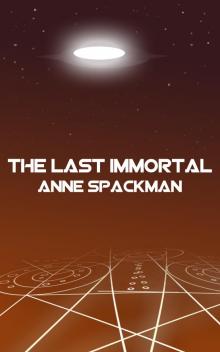 The Last Immortal : Book One of Seeds of a Fallen Empire
The Last Immortal : Book One of Seeds of a Fallen Empire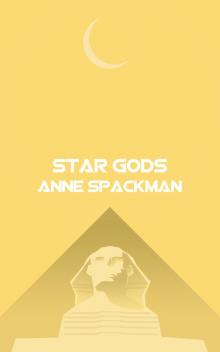 Star Gods: Book Four of Seeds of a Fallen Empire
Star Gods: Book Four of Seeds of a Fallen Empire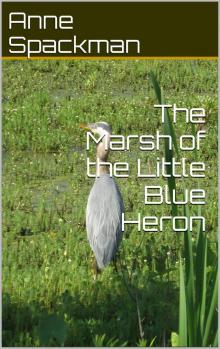 The Marsh of the Little Blue Heron
The Marsh of the Little Blue Heron Cormorant Bay
Cormorant Bay Across the Stars: Book Three of Seeds of a Fallen Empire
Across the Stars: Book Three of Seeds of a Fallen Empire Under the Ash Tree
Under the Ash Tree The Swan Gift
The Swan Gift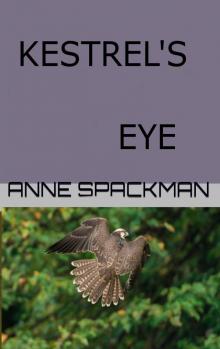 Kestrel's Eye
Kestrel's Eye Caesar and Cleopatra: A Tale of Julius Caesar
Caesar and Cleopatra: A Tale of Julius Caesar The Road to Skye
The Road to Skye Juniper Hill
Juniper Hill The Empire: Book Six of Seeds of a Fallen Empire
The Empire: Book Six of Seeds of a Fallen Empire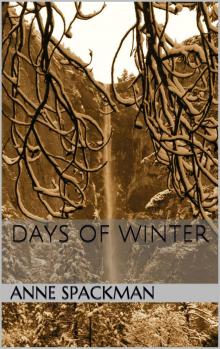 Days of Winter
Days of Winter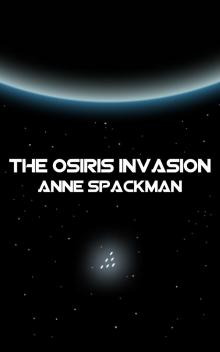 The Osiris Invasion: Book Two of Seeds of a Fallen Empire
The Osiris Invasion: Book Two of Seeds of a Fallen Empire The Comet Riders: Book Five of Seeds of a Fallen Empire
The Comet Riders: Book Five of Seeds of a Fallen Empire Ocean Spirit : The Story of an Undine
Ocean Spirit : The Story of an Undine What Emma Left Behind
What Emma Left Behind The Book of Bird and Fairy Stories
The Book of Bird and Fairy Stories Blackberry Wine
Blackberry Wine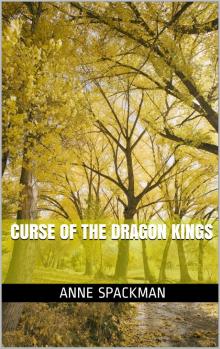 Curse of the Dragon Kings
Curse of the Dragon Kings